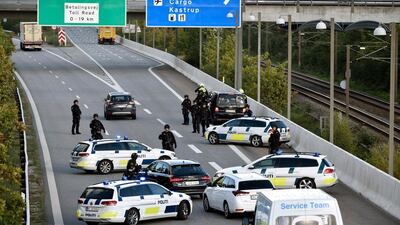The modest sanctions imposed against Iran this week by the European Union are a reflection of Tehran’s increasingly reckless approach to conducting terrorist operations on European soil.
And they also raise questions about why the EU, when faced with compelling evidence of Iranian terrorist activity on its own territory, still refuses to back the Trump administration’s decision to withdraw from the controversial nuclear deal with Iran.
The new EU sanctions, which were announced by the Danish authorities, have been taken in response to mounting evidence that Iran has staged a number of brazen terrorist attacks in several EU states in the past three years.
The most outrageous of these attempts was last year’s plot to bomb an Iranian opposition rally in Paris last year, an operation which, if successful, would have resulted in mass casualties in the French capital on the scale of the Bataclan massacre in 2015, in which 90 people died.
The French authorities have identified Assadollah Assadi, who is currently in custody in Belgium, as the mastermind behind the plot. Assadi, a senior officer with Iran’s Ministry of Intelligence and Security in Vienna, is awaiting trial for his role in the operation. In addition, three other suspects with Iranian connections have been implicated in the bombing. An Iranian couple who were caught with half a kilogram of powerful explosives and a detonator are being held by the French authorities, while French intelligence officers have identified Saeid Hashemi Moghadam, an Iranian deputy minister and director general of intelligence, as also being involved in the attempted bombing.
European intelligence chiefs believe the attempted Paris bomb plot is indicative of a more aggressive policy being adopted by the Iranian regime, particularly against Iranian opposition figures based in Europe.
Iran’s intelligence services have a long history of conducting terrorist operations and assassinations in Europe dating back to the era of the Shah, when Iran’s feared Savak intelligence service regularly carried out assassinations and terror attacks on the European mainland.
But in recent years the Iranians, mindful of the adverse publicity such operations attract, have tended to confine their political assassinations and terrorist operations to the more immediate region, namely countries such as Lebanon, Syria, Iraq and the Gulf states.
Now European intelligence chiefs believe there has been a noticeable change of approach by the Iranians, with Tehran being far more willing to carry out attacks in EU member states.
“Iran appears to be running a number of terrorist networks in Europe, something we have not seen in Europe for some time,” a senior western intelligence officer recently told me. “There seems to have been a conscious change of policy in Iran to extend its terrorist operations beyond the immediate Middle East area.”
One of the more surprising aspects of this new development is that the evidence gathered so far suggests the Iranians began to extend their terrorist operations into Europe soon after signing the controversial nuclear deal negotiated by former US President Barack Obama and other leading powers in 2015, a clear breach of the spirit of the agreement.
When Mr Obama concluded his deal with Tehran, he believed the resolution of the controversial nuclear issue would lead to Iran adopting a more constructive role in its dealings with the outside world.
But the evidence so far collected by European intelligence services suggests otherwise.
The first sign that Tehran had extended its terrorist operations into Europe came when the Dutch authorities accused Iran of being behind the assassination of an Iranian opposition activist Ali Motamed, 56, in Almere in 2015. This was followed by the murder of Ahmad Molla Nissi, 52, another Iranian opposition figure on Dutch soil in The Hague in 2017.
The Dutch intelligence service has now publicly stated that it has “strong indications that Iran was involved in the assassinations of two Dutch nationals of Iranian origin.”
The two killings have prompted the Dutch authorities, working in conjunction with their French counterparts, to take the lead in persuading other EU member states to impose fresh sanctions against Tehran.
Their efforts have been boosted by yet more evidence of Iranian terrorist activity in Denmark, after the Danish police were required to close off access to Copenhagen last October after Danish intelligence officials uncovered a plot by Iranian terrorists to use a car bomb to assassinate an Iranian opposition figure living in the city. This prompted the Danes to recall its ambassador from Tehran and to appeal to the EU for assistance.
To date, Tehran's terrorist operations in Europe have concentrated on targeting Iranian opposition figures. But European intelligence chiefs fear Tehran might be tempted to expand its field of operations to target EU citizens.
The recent upsurge in Iranian terrorist activity in Europe will certainly raise questions about why the EU’s response to date has been so limited. The measures announced last week were merely to place the two Iranian intelligence officers accused of involvement in the Paris and Dutch plots on the EU’s terrorist listing, a move that involves freezing funds and restricting their movement.
Yet, at the same time, the EU still refuses to back the Trump administration’s more robust approach towards Iran by maintaining its support for the nuclear deal, a position I suspect will become increasingly untenable as more evidence of Iranian wrongdoing in Europe continues to emerge.
Con Coughlin is the Daily Telegraph’s Defence and Foreign Affairs Editor


